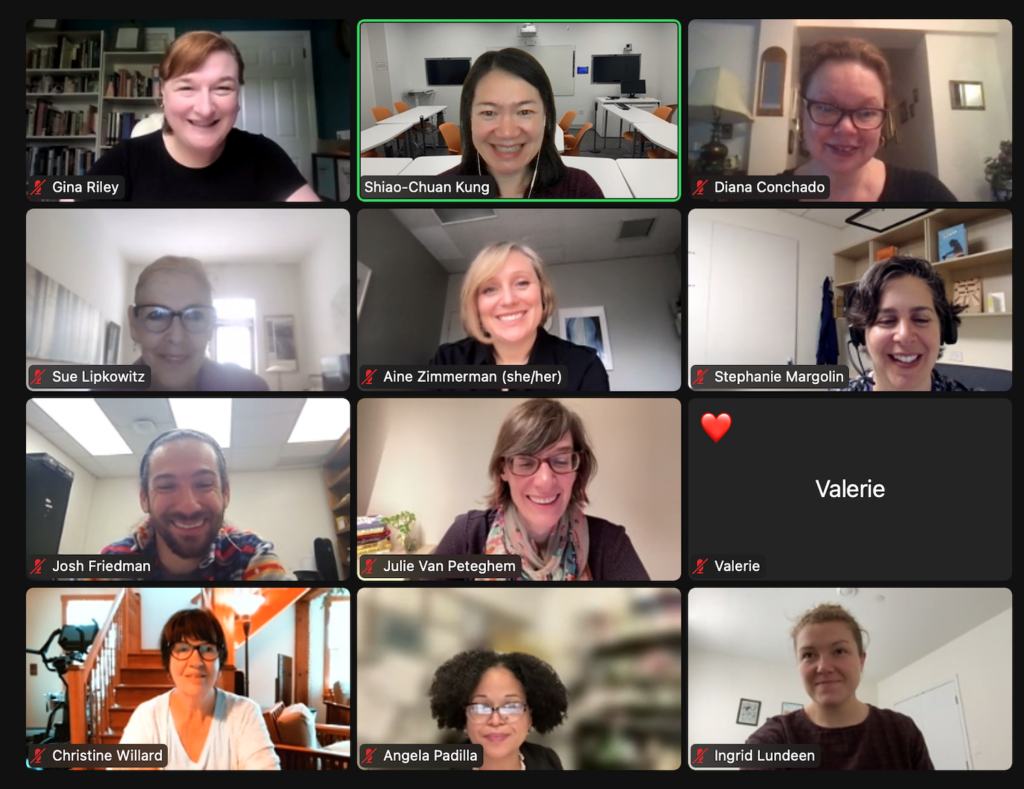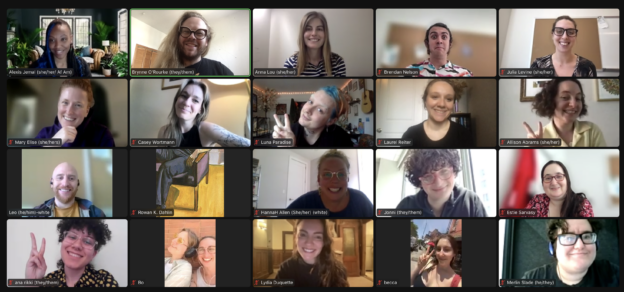Transforming Awareness into Action: Student Created and Led Applied Theatre Workshops
Dr. Alexis Jemal, associate professor at Silberman School of Social Work – Hunter College, developed the first iteration of an MSW elective course, Critical Social Work: Bridging the Micro-Macro Divide, in 2019 and piloted the course in 2020. This class was and is grounded in her Visionary, Philosophical Artivist (theoretical and practice-based) framework to raise critical consciousness and then tap into radical imagination to convert that consciousness into action. Dr. Jemal, with her collaborators from the Masters in Applied Theatre program at CUNY School of Professional Studies, Brynne O’Rourke and Tabatha Lopez, revised the spring 2021 course to integrate applied theatre as the modality through which we bridge the micro-macro divide.
“Applied Theatre” is an umbrella term used to describe a wide range of theatre and drama practices that are often socially engaged, politically inspired, and non-traditional in form, context and venue (e.g., teaching settings, the justice system, health care, the political arena, community development, and social service agencies). Applied Theatre can be a tool for Social Work – education, research, and practice.
The students in that 2021 class did such amazing work with their final projects, that we knew we had to share this experiential learning process beyond our classroom walls. As an ACERT Fellow and Transformative Learning in the Humanities (TLH) Faculty Fellow and having participated in the 2022 CUNY Innovative Teaching Academy Faculty development Institute, (Re-)Embedding Experiential Learning, Dr. Jemal proposed the idea to bring this work to the CUNY-Hunter-Silberman communities.
During the course, students participated in applied theatre games, activities and exercises both as facilitators and participants. Working in groups formed around their social work interests, students created and prepared their final projects for implementation. Thus, on Wednesday 4/26 and 5/3 the Silberman School of Social Work, MSW course, Critical Social Work: Bridging the Micro-Macro Divide with Applied Theatre, presented four student created and led experiential sessions that explore topics in anti-racism, diversity, equity, inclusion, and belonging (ADEIB).
On Wednesday (4/26), the first student group named Radical Rhizomes presented their session, Over, With: Exploring Communication and Conflict. In this hour-long experiential workshop, CUNY community members were invited to join in applied theater games to connect with one another and explore how we show up in (mis)communication and conflict in relationship to our roles and identities. Some of the learning objectives included:
- Relationship building:
- Participants will be able to collaborate and communicate with groups members who hold varying positions within CUNY to complete the session activity
- Critical consciousness raising:
- Participants will be able to identify how miscommunication feels in their bodies
- Participants will begin to normalize conflict and practice critical reflection and accountability, challenging our initial instincts during instances of conflict
- Participants will begin to understand how the individual experience is connected to the systemic issues
- Role investigation:
- Participants will work to understand our roles in communication within social groups
- Participants will explore different roles in experiences of miscommunication
- Participants will interrogate how our social positions and power differentials affect our experiences in classrooms/within systems
Below is a sample of the participant feedback received on the post-session survey:
- The welcoming environment, the back-and-forth between the facilitators, the sequencing of the activities — it all worked so well.
- The whole workshop was organized really well, flowed easily, and encouraged participation by the audience.
- I learned some ways of thinking about communication and its trials and tribulations
The second student group on 4/26, named The Enders, presented their session, Identifying White Supremacy in the Body, a 60-minute experiential workshop that used applied theatre techniques to explore and identify how white supremacy lives in the body. Learning objectives included:
- Help people identify how they feel in their bodies when exposed to white supremacy (WS) culture
- Acknowledge the impact of WS on our bodies
- Exercise the skill of identifying how WS shows up in spaces (educational, personal, professional, etc)
Below is a sample of the participant feedback received on the post-session survey:
- Loved how simple, easy to follow, and relaxed the facilitation and participation was
- The content was difficult BUT really manageable for an hour! I feel like we were able to get to a place where people were open and vulnerable about difficult topics given the fact it was only an hour long.
On Wednesday (5/3), the third student group named Queer Quorum presented their session, What is Gender Affirming Practice? An Immersive Exploration. This hour-long workshop encouraged participants to think creatively about what would be affirming for gender expansive clients in a clinical setting by watching and participating in a family therapy roleplay scene. Learning objectives included:
- Participants will have the opportunity to explore their own gender identities
- Expand ideas about how social workers can serve trans & gender expansive (TGNB) clients
- Examine ways that family dynamics play into care for TGNB clients
Below is a sample of the participant feedback received on the post-session survey:
- I’ve read SO MUCH about boal-style forum theater but never experienced it! I loved this! I just wish we had had more time!
- Really loved it. So layered, so much to think about, excellent work
The final student group on 5/3, named Mighty Mortals, presented their session, Mental Health Possibilities for Silberman/Hunter Students. Participants participated in an engaging experiential exercise to discuss and collectively understand the support systems available to students. Learning objectives included:
- Participants will have the opportunity to reflect on themselves and how they handle intense mental health experiences.
- Engage in the understanding that Hunter/Silberman does have resources that are available for all students.
- Exploring the roles of authority in relation to students and the emotions that can arise.
Below is a sample of the participant feedback received on the post-session survey:
- Had some really thoughtful conversations with peers
- thinking about how burnout is not individual, but systemic
- Silberman (and Hunter and Cuny) as an institution needs to take a lot more responsibility and action in the systems of harm that they perpetuate. At the same time, there is power in students and faculty coming together to commiserate and empathize.
–Written by Alexis Jemal
Transformative Listening: An ACERT Podcast Club

This Spring, we launched the first ACERT Podcast Club, focused on transformative teaching, thanks to the support of the CUNY Transformative Learning in the Humanities Initiative and the Provost’s Office at Hunter College. This was a funded opportunity for part-time and full-time instructors at Hunter. Each meeting, we discussed teaching practices that center and empower students based on various podcast episodes. We explored new research and approaches by leading voices in higher education, and we discussed how to implement ideas within our classroom and workspaces.
We explored 3 main topics: Engagement, Classroom Culture, and Assessment. When discussing Transforming Engagement, we asked ourselves: How can we make our classes more engaging and interactive? How different is student engagement since the return to campus and how can we address this? (Transforming Engagement Podcast Playlist). In the session focused on Transforming Classroom Culture, we thought about how we could create a strong sense of community within our in-person, hybrid, and online classes, and how to create classroom spaces that are warm and welcoming. We also asked the question “How can we build safe spaces for all students so that they feel a sense of belonging and care?” (Transforming Classroom Culture Podcast Playlist). Finally, in our Transforming Assessment discussion, we focused on three questions: Can rigor and assessment coexist in our classrooms? What is “ungrading” and how can we implement it? and What are alternative and innovative ways to create assessments and give feedback? (Transforming Assessment Podcast Playlist)
After every session, faculty also shared their takeaways on a Padlet (see examples here and here). We all learned so much from each other and had some amazing discussions. As a final celebration, we will showcase changes we’ve made to our classrooms or to our pedagogy at the “Transforming our Teaching” Showcase on May 19. Each participant in the Podcast Club will present a 3-minute lightning talk, and share 3 slides on a transformation they made to their practice. Overall, the Podcast Club was such an incredible learning experience, and a true way to highlight and create transformative teaching practices that we will use throughout our careers.
–Written by Gina Riley


